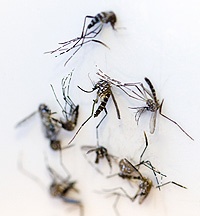Jun 19 2008
Malaria and dengue fever will be the early targets of new trans-Pacific research using minuscule "barcodes" to detect disease.

The University of Queensland (UQ) and the University of Washington (UW) are poised to launch the research after Queensland Premier Anna Bligh announced $650,000 from the National and International Research Alliances Program on June 18.
“Detection of the pathogens of two debilitating mosquito-borne diseases, malaria and dengue fever, is just the first target of this research,” UQ Vice-Chancellor Professor Paul Greenfield said as he welcomed the funding.
“Down the track the results are likely to have widespread applications in medicine, biosecurity, pharmaceuticals and agriculture.
“The researchers are pioneers of ‘nano-barcodes', from which they take electronic read-outs of information about targeted molecules.
“The read-outs are analogous to incredibly detailed inventories of molecules.
“The practical outcome is a diagnostic tool that is cheaper, more sensitive, more accurate and easier to use than established techniques.”
The research team comprises Dr Krassen Dimitrov, a scientist-entrepreneur at UQ's Australian Institute for Bioengineering and Nanotechnology who was formerly at UW, Seattle, along with Dr Daniel T Schwartz and Dr Karl Boehringer, both of UW.
UQ Deputy Vice-Chancellor (Research) Professor David Siddle thanked UW, which is contributing $900,000 (from Washington State's Life Science Discovery Fund) to the two-year $1.8 million project.
“This project will demonstrate the potential of teamwork between UQ and UW. We signed an agreement for cultural, educational and scientific cooperation in 2006 and we launched the $450,000 Trans-Pacific Fellowships this month (June 2008)," Professor Siddle said.
“The governments of Queensland and Washington have significant ties and are supportive of collaborative research."
The prestigious journal Nature Biotechnology published a paper on Dr Dimitrov's barcode work in May 2008.